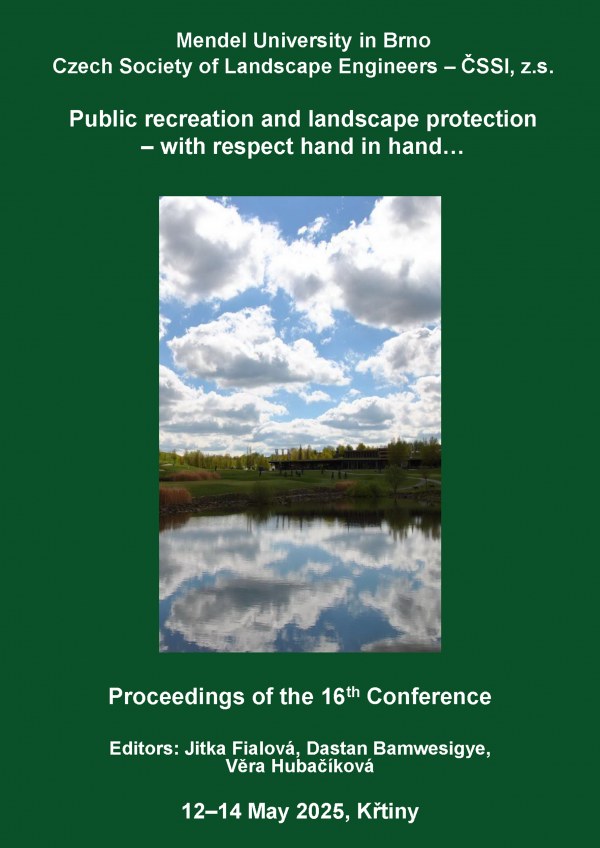
DOI: 10.11118/978-80-7701-025-2-0265
SUSTAINABLE MOUNTAIN TOURISM ACTIVITIES AND INFLUENCE OF FOREST LOSS
- Radu-Daniel Pintilii1, Marian Marin1,2, Ana-Maria Ciobotaru3, Alexandra Zaharia4
- 1 University of Bucharest, Faculty of Geography, 1, Nicolae Bălcescu Bd., 010041, Bucharest, Romania
- 2 Center for Interdisciplinary and Advanced Studies (CISA) – ICUB, University of Bucharest, 202, Splaiul Independenței, Bucharest, Romania
- 3 ,,Gheorghe Balș” Technical College, 107 Republicii Street, 625100, Adjud, Romania
- 4 University of Craiova, Faculty of Sciences, 13, Alexandru Ioan Cuza Street, 20585, Craiova, Romania
The mountain areas in Romania represent an essential ecological region with diverse ecosystems. Forests face threats, such as natural and anthropogenic factors, which drive significant forest loss areas. This paper explores a possible relationship between forest loss and tourism circulation in areas of mountain tourist resorts from the Carpathian Mountains of Romania. Forest loss in mountain areas is caused by multiple natural and/or anthropogenic sources, such as climate change and extreme weather events, deforestation, illegal logging, land use changes, and forest fragmentation. Results showed that the top deforested counties are related to mountain areas, with more than 52% of all tree cover loss between 2001-2023. Land use change and socio-economic modifications had a significant impact on forest management practices. The forest loss in Romania is mainly caused by human activities such as logging, land use changes, and forest fragmentation, amplified by climate change and extreme weather events. Several key strategies for sustainable mountain tourism are needed for successful sustainable tourism development, such as energy communities, local community involvement, and visitor satisfaction.
Keywords: forest ecosystems, mountain areas, Romania, sustainable tourism
pages: 265-271, Published: 2025, online: 2025
References
- Albulescu, A.-C., Manton, M., Larion, D., Angelstam, P., (2022). The Winding Road towards Sustainable Forest Management in Romania, 1989-2022: A Case Study of Post-Communist Social-Ecological Transition. Land 11, 1198. https://doi.org/10.3390/land11081198
 Go to original source...
Go to original source... - Ari, Y., (2020). Protecting biocultural diversity at Kazdaği National Park, Balikesir, Turkey: the role of Sacred Natural Sites. Human Geographies - Journal of Studies And Research in Human Geography 14. https://doi.org/10.5719/hgeo.2020.142.3
 Go to original source...
Go to original source... - Geacu, S., Dumitrașcu, M., Grigorescu, I., (2018). On the Biogeographical Significance of Protected Forest Areas in Southern Romania. Sustainability 10, 2282. https://doi.org/10.3390/su10072282
 Go to original source...
Go to original source... - Hansen, M.C., Potapov, P.V., Moore, R., Hancher, M., Turubanova, S.A., Tyukavina, A., Thau, D., Stehman, S.V., Goetz, S.J., Loveland, T.R., et al. 2013. High-Resolution Global Maps of 21st-Century Forest Cover Change. Science 342, 850-853. https://doi.org/10.1126/science.1244693
 Go to original source...
Go to original source... - Kocak, E., Cavusoglu, M., 2024. Is there a conservation relationship between tourism, economic output, and forest areas? Conservation Science and Practice 6, e13171. https://doi.org/10.1111/csp2.13171
 Go to original source...
Go to original source... - Kamata, H., Misui, Y. and Yamauchi, H. (2010), "How to attract more tourists?", Tourism Review, Vol. 65 No. 2, pp. 28-40. https://doi.org/10.1108/16605371011061606
 Go to original source...
Go to original source... - Munanura, I.E., Backman, K.F., Sabuhoro, E., Bernhard, K.P., (2020). The Potential of Tourism Benefits to Reduce Forest Dependence Behavior of Impoverished Residents Adjacent to Volcanoes National Park in Rwanda. Tourism Planning & Development 17, 475-496. https://doi.org/10.1080/21568316.2019.1640282
 Go to original source...
Go to original source... - Munteanu, C., Nita, M.D., Abrudan, I.V., Radeloff, V.C., (2016). Historical forest management in Romania is imposing strong legacies on contemporary forests and their management. Forest Ecology and Management 361, 179-193. https://doi.org/10.1016/j.foreco.2015.11.023
 Go to original source...
Go to original source... - Nichiforel, L., Duduman, G., Scriban, R.E., Popa, B., Barnoaiea, I., Drăgoi, M., (2021). Forest ecosystem services in Romania: Orchestrating regulatory and voluntary planning documents. Ecosystem Services 49, 101276. https://doi.org/10.1016/j.ecoser.2021.101276
 Go to original source...
Go to original source... - Pîrghie, T.F., Matei, E., (2020). Importance of environment quality in sustainable tourism destinations: the young tourists' perception. Human Geographies - Journal of Studies And Research in Human Geography 14. https://doi.org/10.5719/hgeo.2020.142.7
 Go to original source...
Go to original source... - Platon, V., Frone, S., Constantinescu, A., (2015). New Developments in Assessing Forest Ecosystem Services in Romania. Procedia Economics and Finance 22, 45-54. https://doi.org/10.1016/S2212-5671(15)00225-7
 Go to original source...
Go to original source... - Platon, V., Frone, S., Constantinescu, A., (2019). Challenges and Innovations to Sustainable Forest Management in Romania: Virgin Forests as Heritage, in: Vasile, V. (Ed.), Caring and Sharing: The Cultural Heritage Environment as an Agent for Change, Springer Proceedings in Business and Economics. Springer International Publishing, Cham, pp. 203-212. https://doi.org/10.1007/978-3-319-89468-3_17
 Go to original source...
Go to original source... - Salimi, M., (2022). AN ANALYTICAL MODEL FOR DETERMINING THE PER CAPITA INDEX OF SPORTS PLACES AND SPACES. JURA 14. https://doi.org/10.37043/JURA.2022.14.1.6
 Go to original source...
Go to original source... - Sloan, S., Sayer, J.A., (2015). Forest Resources Assessment of 2015 shows positive global trends but forest loss and degradation persist in poor tropical countries. Forest Ecology and Management 352, 134-145. https://doi.org/10.1016/j.foreco.2015.06.013
 Go to original source...
Go to original source... - Tampakis, S., Andrea, V., Karanikola, P., Pailas, I., (2019). The Growth of Mountain Tourism in a Traditional Forest Area of Greece. Forests 10, 1022. https://doi.org/10.3390/f10111022
 Go to original source...
Go to original source... - TAVAKOLINIA, J., SHAMS POUYA, M.K., 2022. THE ROLE OF SOCIAL CAPITAL OF TOURIST HOST COMMUNITIES IN LOCAL DEVELOPMENT. Journal of Urban and Regional Analysis 14.
- Tudoran, G.M., Zotta, M., (2020). Adapting the planning and management of Norway spruce forests in mountain areas of Romania to environmental conditions including climate change. Science of The Total Environment 698, 133761. https://doi.org/10.1016/j.scitotenv.2019.133761
 Go to original source...
Go to original source... - Vasile, M., (2020). The Rise and Fall of a Timber Baron: Political Forests and Unruly Coalitions in the Carpathian Mountains of Romania. Annals of the American Association of Geographers 110, 1952-1968. https://doi.org/10.1080/24694452.2020.1723399
 Go to original source...
Go to original source... - Zhang, X., Dolah, J., Cao, Z., (2025). Sustainable Nature Tourism and Forest Conservation Strategies Based on Forest Wellness Tourism Demand: A Case Study of Royal Belum State Park, Malaysia. Forests 16, 270. https://doi.org/10.3390/f16020270
 Go to original source...
Go to original source...


